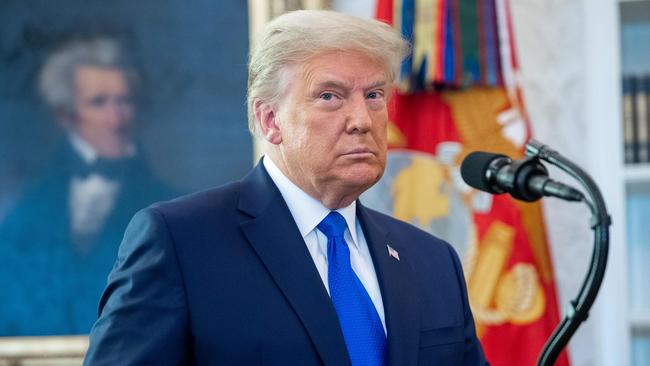
This transformation has been the subject of much hand wringing and, occasionally, some genuine inquiry. Even the genuine inquiries, however, have tended to neglect something that should be obvious. In a two-party system, changes on one side are often more or less reactions to changes on the other. In particular, the right-wing party in a two-party system tends to react to developments in the left-wing party.
If the Republican Party has changed, it stands to reason that it has at least something to do with changes in the Democratic Party.
The transformation of the Democratic Party has often been obscured during the past four years by the antics of Trump but is now highlighted in the flurry of executive orders and announcements emanating from the budding Biden administration.
The announcement that the Treasury Department will resume a push to put 19th-century African-American abolitionist Harriet Tubman on the front of the $US20 bill, instead of Andrew Jackson, the seventh president and in many ways the founder of popular democracy in the US, points to how the Democrats, for much of their history proudly the party of Jackson, have become the anti-Jacksonian party.
The consequences of this, in a nation where the legacy of Jackson is everywhere and Jacksonian impulses run deep, are profound.
Certainly, there is nothing radical about the Tubman proposal. The heroine of the Underground Railroad (a network of secret routes used by the enslaved to escape into free states) is a less controversial figure in contemporary America than slaveholder Jackson, who also fought Native Americans. He would not be removed from the bill entirely but merely moved to the back.
And the proposal is not new. It was first mooted in 2016 under Barack Obama before being put on the backburner under Trump, who hung a portrait of Jackson in the Oval Office, since replaced by one of the least controversial of the founders, Benjamin Franklin.
Moreover, to say the Democrats are now anti-Jacksonian is not to say the party is unpopular. Joe Biden won 79 million votes in the election last year, more than anyone has won in the US before.
Rather, the point is the Democrats’ changed attitude to their own history indicates the party’s increasing discomfort with the origins of the American nation itself. It also points to the fragility of the anti-Trump coalition and why comparisons with the New Deal coalition that dominated in the 1930s and 40s are fanciful.
As noted by Arthur Schlesinger, author of the Jackson-positive The Age of Jackson, the almost hagiographic The Age of Roosevelt and court historian for John F. Kennedy, Jackson and Democrat president Franklin D. Roosevelt had “much the same array of supporters and much the same array of enemies”. That could not be said about FDR and Biden. The bedrock of the New Deal coalition was the Jim Crow south. Biden campaigned on putting an end to “white supremacy”, understood in a way no one from FDR’s era would have recognised.
More to the point, it was the support of the working class that allowed FDR to win 42 states in 1932 and stay in office for a “norm-breaking” four terms. But in the past few decades, whites with college degrees, once reliably Republican, have shifted towards the Democrats while whites without degrees have shifted to the Republicans. This voter swap means not only that traditionally Democratic rhetoric tends to come from Republicans but also that even when the Democrats do attain an electoral majority, it is bunched in the richest parts of the country and too thin to be stable.
Again, it’s not as simple as “the Democrats have become the party of the elite”. Both parties retain much traditional support and non-whites still overwhelmingly vote Democrat, though Jacksonianism tends to do well among immigrants and their descendants once they see themselves as “core Americans”, and Republican gains among Latinos will have worried Democratic strategists.
It’s even possible Biden clawed back some white working-class support, though this remains disputed. But in a pattern French economist Thomas Piketty has observed in Britain and France as well as the US, left-wing parties that come to be dependent on voters with degrees inevitably downplay or even abandon their traditional economic agendas, while embracing a cultural agenda that inevitably results in leaking supporters to the right.
Most commentators on US politics are degree holders and Democrat supporters, and were so long before the rise of Trump. As participants in, rather than observers of, the transformation of the Democratic Party, they seem to have found it difficult to process the consequences of this transformation, which predates Trump and was one of the causes of his presidency rather than the other way around, though he has surely accelerated it.
Today’s Democratic coalition is large. And as the victories in the two Georgia Senate run-off races suggest, the Democrats will probably continue to make gains among whites with college degrees. But it is a coalition especially unsuited to commanding a stable majority in a country as large and diverse as the US, with a federal political system and a robust Jacksonian tradition.
The Republican Party may appear to be — and really is — in disarray right. The division between those who always opposed Trump or now want to move on after his defeat and second impeachment and those for whom loyalty to Trump is the test of whether one is really a Republican is stark and not going away. But it is unlikely to lead to the party breaking up. Nor is it incompatible with long-term electoral success.
For there is one big reason people are Republicans: they are not the Democrats. This is more true than ever. Something that often is not evident to foreigners is that America is in many ways a one-party society now, and not a conservative one. Nearly all of the commanding cultural and economic institutions are controlled by Democrats or progressive fellow travellers. This leaves people who object to this ascendancy no choice but to vote for the other party in what remains a two-party system. And the US, as it always has, contains a lot of objectors. Foreigners should count on future Republican victories, and soon.
John Sexton is a PhD candidate at the University of Chicago and has taught US politics at the University of Sydney.



What happened to the Democratic Party? This is not a question you’re likely to hear at a cocktail party, or were likely to hear back in pre-COVID days when people still had cocktail parties. For the past four years, in capitals around the world and in countless opinion pieces, journal articles and books, the focus has been on the transformation of the Republican Party, the party of Abe Lincoln, into the party of Donald Trump.